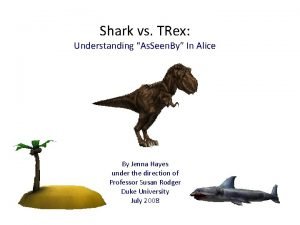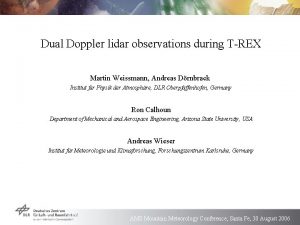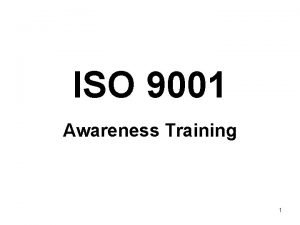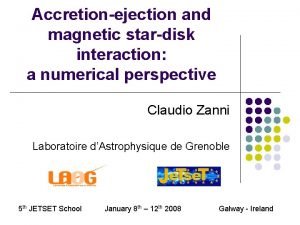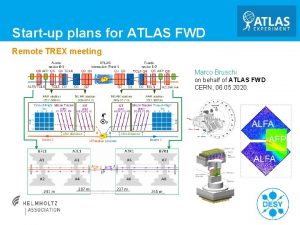TREX Meeting SestoSexten 23 rd July 2015 Stardisk















- Slides: 15

T-REX Meeting – Sesto/Sexten – 23 rd July 2015 Star-disk interaction in young stars with E-ELT/HIRES A preview from X-Shooter spectra Simone Antoniucci (INAF–OA Roma) and JEDI collaborators J. Alcalà, K. Biazzo, F. Bacciotti, R. Bonito, C. Codella, E. Covino, F. Fontani, D. Fedele, A. Frasca, T. Giannini, G. Li Causi, D. Lorenzetti, C. Manara, B. Nisini, A. Natta, L. Podio, L. Testi, G. Santangelo, B. Stelzer, M. Tazzari Jets and Disks @ Inaf

From cores to planetary systems HH 30 HST core Hernandez + 2007, Fedele+ 2011 HH 30 HST disk accretion/jets transitional disk/ planet formation debris disk / planetary system HL Tau ALMA Fomalhaut HST Inner disk accretion/clearing: e-folding time ~ 2 -3 Myr t T-REX meeting - Sesto - July 2015 - S. Antoniucci

Protostellar system: star-disk interaction Star + magnetic field + gaseous inner disk (accretion/winds) + dusty disk adapted from Dullemond & Monnier 2010 1 AU @150 pc = 7 mas What we know now: winds/jets inner gas disk accretion flows accretion shock § Evolution of star and disk are tightly coupled § We know very little about magnetic fields (but they are extremely important!) § Gas (chemistry) and dust (size distribution) evolve with time and are affected by the star § Structure of the inner disk (and its evolution) is critical for outcome of planet formation (planets in the habitable zone and their characteristics) T-REX meeting - Sesto - July 2015 - S. Antoniucci

Optical-NIR spectrum of YSOs: X-Shooter VLT/X-Shooter 0. 3 -2. 5 um spectrum of a young stellar object RU Lup (K 7; M 1 M ) 10 -11 Fλ (erg/s/cm 2/nm) Alcalá+ 2014 (R~10000) 10 -12 300 400 500 600 700 800 900 1000 2000 λ (nm) Antoniucci+ 2015 Emission § UV excess, IR excess accretion, veiling HI lines § HI lines & other permitted lines (OI, He. I, Ca. II, Fe. I, Ti. I, Na. I, …) probe inner circumstellar structures (accretion, winds) § Forbidden lines ([Fe. II], [OI], [SII], [NII], …) wind/jet diagnostics Abs. § Molecular lines (H 2, CO, H 2 O, OH) disk, jet diagnostics v (km/s) § Photospheric features spectral type, luminosity class, magnetic field, veiling T-REX meeting - Sesto - July 2015 - S. Antoniucci

X-Shooter spectra: accretion & emission lines X-Shooter complete characterization of stellar and accretion properties of sources, mostly Classical T Tauri stars (class II obejcts) • Significant effort to perform X-Shooter surveys of several star-forming regions (Cha, Lup, ρ Oph, σ Ori, Cr. A, …) JEts and Disks @ Inaf OAR, OACN, OAA, OACt, OAPa • JEDI: our italian group working on this subject http: //www. oa-roma. inaf. it/irgroup/JEDI/Home. html Alcalá+ 2014, Manara+ 2015 Multiple photospheric features fitting Excess continuum fitting Lacc-line relationships T-REX meeting - Sesto - July 2015 - S. Antoniucci

Mass accretion 0. 3 -2. 5 μm coverage diagnostics for mass accretion rate (UV excess, emission lines) Macc vs source parameters, Macc vs time evolution Alcalá+ 2014, Manara+ 2015 Antoniucci+ 2014 embedded/younger sources (Class I) BDs and below § ELT+HIRES accretion in brown dwarfs and below (limit is our knowledge of chromospheric activity in stars without disks, Manara+ 2013), accretion in farther starforming regions (LMC/SMC), accretion dependence on metallicity, accretion in embedded (younger) sources T-REX meeting - Sesto - July 2015 - S. Antoniucci

HI lines: info on circumstellar gas Wide spectral coverage use multiple lines: HI series decrements properties of hot gas in the inner circumstellar region (accretion/winds/disk) Kwan & Fischer 2011 emission line models: self-consistent radiative transfer calculations, can manage optically thick emission H Hβ Hγ Hδ Hε H 8 H 9 H 10 H 11 Normalized Flux Balmer decrements Antoniucci+ 2015 in prep • Decrement analysis provides range of gas T (3000 -20000 K) and n (108 – 1011 cm-3), shape correlates with accretion rate • Refined radiative transfer models are required + line profiles are often difficult to interpret • HIRES sensitivity to study same gas through other tracers (e. g. [OI], Ca. II, H 2 O, …), often easier to interpret (optically thin lines) v (km/s) T-REX meeting - Sesto - July 2015 - S. Antoniucci

High resolution spectra: profile analysis TNG/Giano NIR spectra of pre-Main Sequence objects (R~50000) Nisini, Antoniucci+ in prep XZ Tau Normalized flux XZ Tau He I traces winds HI traces accretion flows HIRES high resolution analysis: study variations of source structures through different tracers (shifts, appearance/disappearance of peaks/dims) revealing modifications in gas geometry and kinematics T-REX meeting - Sesto - July 2015 - S. Antoniucci

Inner gaseous disk Rmin=20 AU i=5° Rmin=20 AU i=30° inner radius HIRES: high sensitivity & high resolution (R > 50000, few km/s) X-Shooter spectra, Manara+2013 inner radius Najita+ 2009, Doppmann+ 2011 probe the kinematics and gas content of the inner region of the disk [OI] slow winds (photoevaporation? ) Rmin=50 AU i=30° CO ν=2 -1 H 2 O T-REX meeting - Sesto - July 2015 - S. Antoniucci

Excitation and dynamics of winds/jets stellar wind X-wind disk-wind Forbidden lines in X-Shooter spectrum of ESO -Ha 574 accretion [SII] 6716 § Use large number of lines to probe different excitation layers in the jet § Constraints on physical parameters in the jet T, n, xe, Av, dust depletion § Estimate mass loss rate, correlation with source properties § Models for nebular emission lines [SII] 6731 d (arcsec) § Constraints on physical parameters in the jet acceleration region (< 1003 -4 AU) T, n, xe, Av, Par-Lup dust depletion jet § Accurate measure of the radial (and angular) velocity field measure Mwind and efficiency of angular momentum extraction § Understand effects on disk gas/dust dispersal and evolution affects formation of planets X-Shooter Whelan+ 2014 LSR Velocity (kms-1) Giannini+ 2014 T-REX meeting - Sesto - July 2015 - S. Antoniucci

Excitation and dynamics of winds/jets stellar wind X-wind disk-wind accretion § Use large number of lines to probe different excitation layers in the jet § Constraints on physical parameters in the jet T, n, xe, Av, dust depletion § Estimate mass loss rate, correlation with source properties § Models for nebular emission lines Forbidden lines in X-Shooter spectrum of ESO -Ha 574 test different jet-launching models from kinematic components (jet acceleration/collimation within 10 -100 AU, ~70700 mas at 150 pc, AO is critical, IFU mode!) find signature of jet rotation (few km/s) and accurately measure the radial (and angular) velocity field mass loss rate and efficiency of angular momentum extraction understand implications for disk gas dispersal and evolution (affects formation of planets) Giannini+ 2014 T-REX meeting - Sesto - July 2015 - S. Antoniucci

Stellar and accretion properties of embedded protostars § High-sensitivity, high-resolution near-IR spectra are needed to detect the weak photospheric absorption lines in heavily veiled (strong excess continuum) embedded (much younger) sources source characterization (stellar + accretion parameters) Br 12 Br 13 Nisini, Antoniucci+ 2005 Antoniucci+ 2014 Brγ Fλ T-REX meeting - Sesto - July 2015 - S. Antoniucci

Magnetic fields Johns-Krull 2009, Gregory+ 2012, Donati+ 2012, Hussain 2012 § Very few measurements up to now, only brightest objects § Variations of polarized profiles to reconstruct MF topology § Extension to large number of sources is critical to understand impact on disk+star evolution Requirements (why HIRES is perfect): § High sensitivity + high spectral resolution (R = 100000), polarimetric mode § Broad spectral coverage T-REX meeting - Sesto - July 2015 - S. Antoniucci

HIRES for star-disk interaction: a preview q Mass accretion in YSOs § Fully characterize Macc in BDs, younger/embedded sources, farther starforming regions § Resolution > 5 104 and NIR critical for younger/embedded sources § IFU and AO mode would be good to try to connect to the inner disk/wind q Jets/ouflows § High resolution and AO mode required R~105 to measure jet rotation and disentangle jet-launching models; slit or IFU (would be good!) q Inner gaseous disk § High resolution R~105 for detecting lines through telluric features, profiles q Magnetic fields § High resolution R~105; polarimetry; seeing-limited ok q Important: synergy with ALMA § For all previous points synergy with ALMA is critical to study connection with the outer disk evolution and the large scale outflows Check the HIRES white paper (http: //arxiv. org/abs/1310. 3163) T-REX meeting - Sesto - July 2015 - S. Antoniucci

T-REX meeting – Sesto – July 2015 – Simone Antoniucci Grazie “A che tante facelle? ” – G. Leopardi





